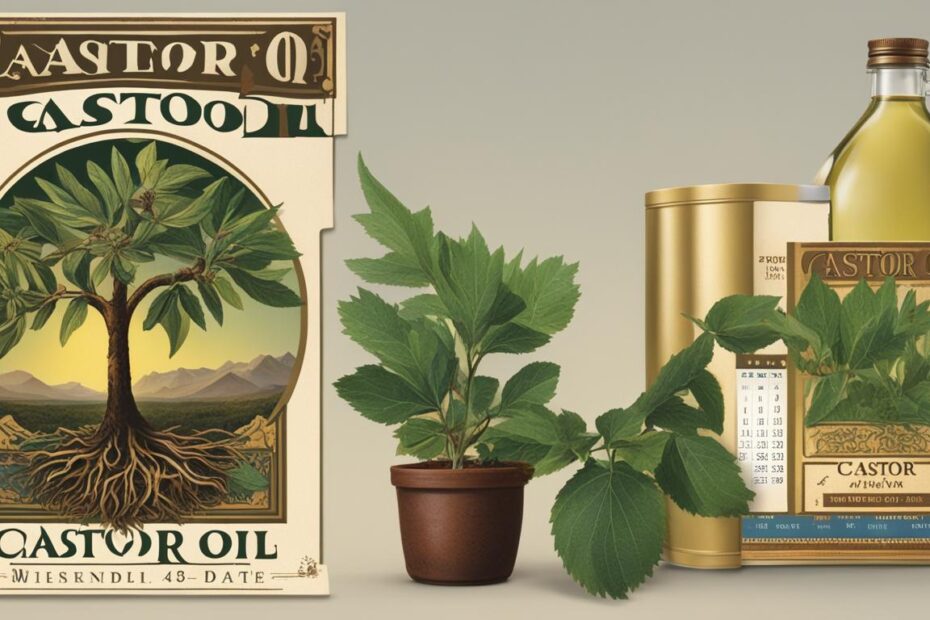Castor oil, like many other oils, has a shelf life and can expire over time. It is important to know the signs of spoilage and the proper storage methods to extend its shelf life effectively.
The shelf life of castor oil is typically up to one year, although cold-pressed castor oil can last up to five years when stored properly. Incorrect storage conditions, such as exposure to heat, moisture, and sunlight, can have adverse effects on the quality of the oil and cause it to degrade faster.
It is important to check the packaging for any damage before purchasing and always go by the expiry date mentioned on the packaging. Using expired castor oil externally or internally can lead to potential skin irritation, infections, and unpleasant odor.
Proper storage in a cool, dark place and using sealed bottles are essential to maintain the freshness and effectiveness of castor oil.
Key Takeaways:
- Castor oil has a shelf life and can expire over time.
- Proper storage conditions are crucial to extending the shelf life of castor oil.
- Exposure to heat, moisture, and sunlight can cause castor oil to degrade faster.
- Always check the packaging for any damage and follow the expiry date guidelines.
- Using expired castor oil can lead to skin irritation, infections, and unpleasant odor.
How to Store Castor Oil to Extend its Shelf Life
Proper storage is key to extending the shelf life of castor oil and maintaining its quality. Here are some important points to remember while storing castor oil:
- Keep it in a cool, dark place: Castor oil should be stored away from direct sunlight and heat sources. Exposure to these elements can accelerate the oil’s degradation process and reduce its shelf life.
- Protect it from moisture: Moisture can cause castor oil to spoil quickly. To prevent this, make sure the bottle is tightly sealed to keep out any moisture or humidity.
- Use airtight containers: When transferring castor oil to a different container, ensure that it is airtight to prevent air from entering and oxidizing the oil. Oxygen exposure can lead to rancidity and spoilage.
- Avoid frequent temperature changes: Fluctuations in temperature can negatively affect the quality of castor oil. It’s best to store it in an area with a stable temperature to avoid any adverse effects.
- Check the expiration date: Castor oil does have an expiration date, so it’s essential to check the packaging for this information. Using expired castor oil can lead to reduced effectiveness and potential side effects.
“Proper storage plays a crucial role in preserving the freshness and efficacy of castor oil. By following these storage guidelines, you can extend its shelf life and continue to reap the benefits it offers.”
By implementing these storage practices, you can ensure that your castor oil remains fresh and usable for an extended period. Taking these simple steps to preserve the oil will allow you to experience its countless benefits with maximum potency.
Do’s and Don’ts for Proper Storage of Castor Oil
| Do’s | Don’ts |
|---|---|
| Store in a cool, dark place | Expose to direct sunlight |
| Keep away from heat sources | Place near stoves or heaters |
| Ensure airtight containers | Use open or loosely sealed bottles |
| Protect from moisture | Store in a humid environment |
| Check the expiration date | Use expired castor oil |
Signs of Expired Castor Oil
It is important to be able to recognize the signs of spoiled castor oil to avoid using it and potentially experiencing adverse effects. Here are some signs that indicate spoilage or expiration of castor oil:
- The oil produces a foul or rancid odor. Expired castor oil often has a strong, unpleasant smell that is distinctly different from the characteristic mild scent of fresh castor oil.
- The oil changes color. If the castor oil appears darker or cloudier than usual, it may be a sign of spoilage. Fresh castor oil is typically clear or pale yellow in color.
- The oil becomes thicker in consistency. Expired castor oil may become thicker or have a sticky texture compared to its normal smooth and liquid consistency.
- The oil develops a sour taste. If you ingest castor oil and notice a sour or off-flavor, it could indicate that the oil is no longer suitable for use.
- The oil shows signs of contamination. If you notice any mold growth, particles, or discoloration in the oil, it is best to discard it.
By staying vigilant and looking out for these signs, you can easily identify expired or spoiled castor oil and avoid using it, ensuring the highest quality and effectiveness for your castor oil-based products or remedies.

| Signs of Expired Castor Oil | Description |
|---|---|
| Foul or Rancid Odor | A strong, unpleasant smell different from fresh castor oil. |
| Color Change | Darker or cloudier appearance compared to normal clear or pale yellow color. |
| Thicker Consistency | Increased viscosity or sticky texture. |
| Sour Taste | An off-flavor that indicates spoilage when consumed. |
| Contamination | Mold growth, particles, or discoloration in the oil. |
Conclusion
In conclusion, castor oil, like many other oils, has a limited shelf life and can expire over time. To ensure the longevity and effectiveness of castor oil, it is crucial to store it properly. This involves maintaining the right temperature, protecting it from moisture and sunlight, using sealed bottles, and checking the expiry date. By following these storage methods, you can extend the shelf life of castor oil and preserve its quality for longer.
Additionally, it is important to be able to recognize the signs of expired castor oil. Changes in color, odor, and texture are indicators of spoilage. Using expired castor oil can potentially lead to adverse effects such as skin irritation, infections, and unpleasant odor. It is always better to err on the side of caution and avoid using castor oil that shows signs of expiration.
By being mindful of the storage conditions and expiration date of castor oil, you can ensure that you are using a fresh and effective product. Proper storage practices and awareness of castor oil’s shelf life are key factors in maximizing its benefits and maintaining its quality.
FAQ
Can castor oil expire?
Yes, castor oil can expire. It has a shelf life of up to one year, although cold-pressed castor oil can last up to five years when stored properly.
Does castor oil have an expiration date?
Yes, castor oil has an expiration date. It is important to check the packaging for the expiry date before purchasing.
What are the signs of expired castor oil?
Signs of expired castor oil include changes in color, such as turning slightly yellow or darker, unpleasant odor, and changes in texture.
What is the shelf life of castor oil?
The shelf life of castor oil is typically up to one year, but cold-pressed castor oil can last up to five years when stored properly.
How long does castor oil last if stored properly?
If stored properly, castor oil can last up to one year. Cold-pressed castor oil, on the other hand, can last up to five years.
Can old castor oil be used?
It is recommended to avoid using old castor oil. Using expired castor oil externally or internally can lead to potential skin irritation, infections, and unpleasant odor.
What can I do with expired castor oil?
It is best not to use expired castor oil. Instead, dispose of it properly and consider purchasing fresh castor oil.
Is there a best before date for castor oil?
Yes, there is a best before date for castor oil. It is important to check the packaging for the expiry date and use the oil before that date.
What is the proper storage method for castor oil?
Proper storage includes keeping castor oil in a cool, dark place, away from heat, moisture, and sunlight. Using sealed bottles also helps maintain its freshness and effectiveness.
